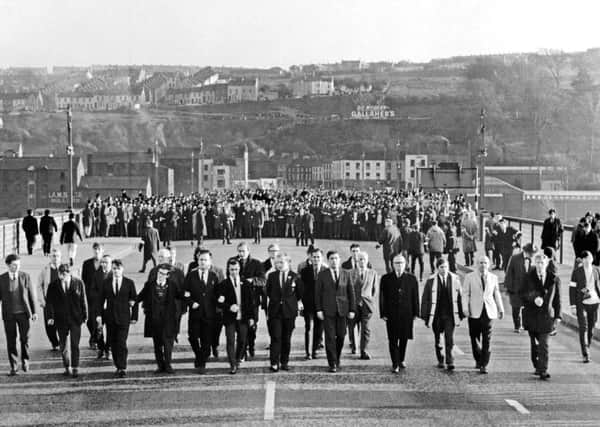'˜It could all have been so different'


SDLP East Derry Assembly Member John Dallat was speaking after attending a series of events in Derry City at the weekend to commemorate the 50th anniversary of the Duke Street Civil Rights March of October 5, 1968. On that fateful march police violence resulted in the those present being prevented from reaching a planned rally at the city centre.
Over the weekend past, Mr Dallat joined President Michael D Higgins and civil rights veterans to reflect on the events at that time.
Advertisement
Hide AdAdvertisement
Hide AdMr Dallat said: “As a 21-year-old in my fourth week teaching in the Technical College in Carndonagh, County Donegal I was on my first shopping trip to the city following my appointment. I was accompanied by three of my new colleagues who were also new teachers and from different parts of Ireland. We were looking forward to attending the Civil Rights Rally but it was not to be, and I often wondered what would have happened if things had been different. What would have happened if the RUC instead of drawing batons and sending in water cannons had allowed the march to proceed?”


Mr Dallat said the Civil Rights campaign was important to him personally “because my family lived in a house with neither running water, electricity nor proper sanitation and extreme cold and damp”.
Mr Dallat said that at the time he had just written to three different technical colleges in the North asking for application forms “but didn’t return them because one of the questions was: ‘What is your religion’ and I threw them in the fire and applied for a post in Donegal where I spent six very happy years in an environment where religion or politics was never discussed and the students were both Catholic and Protestant.”
He added: “The events of that day are now history and we relived them at the weekend and I am angry because I can see that even today, with all the hindsight and experience of that and many other days, lessons have not been learned by many of those now pulling the political strings.
Advertisement
Hide AdAdvertisement
Hide Ad“There are still politicians with mind-sets similar to the middle-class unionist politicians of 50 years ago would lead us down the same road again believing one community can suppress the other and that is unforgivable.”
Mr Dallat continued: “There were parallels between Derry City and my town of Kilrea. Both had Nationalist majorities albeit in on a different scale but housing went largely to Protestant families.
“Few Catholics had jobs in public services such as the Electricity Board, Water Board, Telephones or indeed the civil service.
“There were 2,400 on the waiting list for houses in Derry with only 22 built in 1968 and in Kilrea 48 new homes went almost exclusively to Protestant families and that was the background to the Northern Ireland Civil Rights Association and the hope that it could change a policy which set one community against the other when in many cases both were short-changed by inequality.”
Advertisement
Hide AdAdvertisement
Hide AdHe concluded: “I visited Derry City many times over the years and I saw the destruction that followed.
“I heard about people murdered, businesses ruined and opportunities lost. I saw the despair on the faces of people and I wondered if only those civil rights marchers had been allowed to proceed for a peaceful rally.”